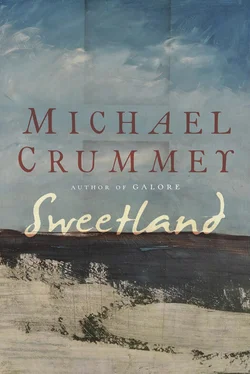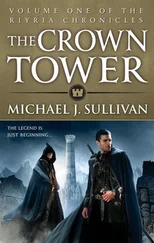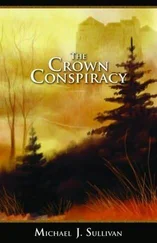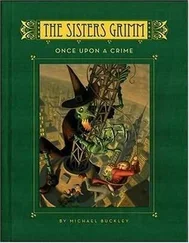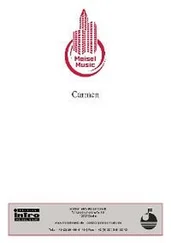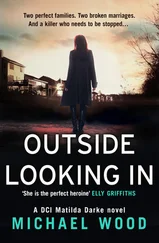He could see the line of letters glued to the inside and his hands were shaking when he laid it flat on the counter. YOU GET OUT, it said, OR YOULL BE SOME SORRY. Sweetland leaned on the counter, rubbed his face across his shoulder. A feeling like bugs crawling beneath his clothes. No telling how long it had been sitting there, waiting for him to come across it, but the threat had a biblical air about it now, something irrefutable and final. He balled the sheet and turned to the stove, threw it into the fire. Set the damper back without waiting to see it catch.
He scrubbed his hands clean and then he set the rabbit in the gleaming sink to dress it, the naked carcass inching free of the fur. He scooped the head and feet and the entrails into a silver bowl that he set aside as he quartered the rabbit. He went out to the root cellar for potatoes and carrot and turnip and when he came back to the kitchen the dog was lying near the stove, sniffing at the blood in the air. Sweetland stopped in the porch doorway and they stared at one another.
“I hope you wiped your feet before you come in,” he said finally.
He lit the two lamps and made a pastry for his stew and set the crock-pot in the oven. He picked the heart and liver from the silver bowl and he fried them up with a little meat he’d set aside and when it had cooled he put it down for the dog. He watched the animal push the bowl across the floor with its muzzle, licking the dish clean. Sweetland filled the empty bowl with water and when the dog had its fill of that it stretched out in the heat beneath the daybed.
Sweetland changed out of his filthy clothes while his supper was cooking, boiled them in a metal tub, rinsed and wrung them in the sink, hung them on a line above the stove. He sat to the table with the rabbit stew and as he lifted the first spoonful he caught sight of Uncle Clar leaning against the wall across the room, eyes averted, pretending to pay Sweetland no mind.
He went to the daybed and hefted the weight of the picture frame. Considered setting it back in the hallway where it had been. But he carried it into the porch instead, hung it on a nail kitty-corner to the door. So Uncle Clar would have at least that much company when he came and went.
THEY FOUND WORK building split-level bungalows among crews of Italians and Hungarians and Caribbeans. They were so far outside the city that it was only Saturday evenings they could make the trek into Toronto. They drank at the Caribou Club, a new bar catering to the expats who’d left Newfoundland to work in Ontario’s packing plants and factories, in the auto sector, on road gangs. Economic refugees mourning the anachronistic little world they’d abandoned, the squat saltboxes that housed three generations, the brawling weather, the root cellars and fish flakes and outhouses, the rabbit warren of bloodlines knitting the tiny outports into impossible tangles. Old Sam and Dominion Ale and cod liver oil, Tibb’s Eve and Candlemas Day and Sheila’s Brush and Radway’s Ready Relief, Jackie tars and colcannon and breakfast fish. A weakness for superstition and singing and tribal politics. An antediluvian vocabulary spoken in accents so inbred and misshapen they felt like foreigners everywhere else in the city.
The club was on College Street in the heart of Little Italy. A yearly membership fee of two-fifty. They drank with familiar strangers from Conception Bay and the Codroy Valley and Placentia, from the French Shore, the Bay of Islands, the Burin. Men who made twice their wages packing meat or watching bottles trundle along conveyor belts or marking time on assembly lines of one description or other. The crowd drunken and good-naturedly nostalgic, arguing the merits of punts and skiffs and dories, talking Joey Smallwood or the Newfie Bullet or Churchill Falls or whether beer mixed with ginger ale was a fit drink for a lady. The Caribou Show Band packing the dance floor, dressed in their red polyester sport jackets.
They stayed until the club closed its doors and then moved on to house parties, sometimes winding up in a city park or a cemetery where they slept under trees or between the graves. Woke on damp grass in the open air, their clothes and hair wet with dew. They took their all-day hangovers to a restaurant on College with a bottomless cup of coffee, then to the movies at the Odeon or to wrestling shows at Maple Leaf Gardens, before hitching a ride back out to the worksite in the evening. Talking all the time about when they might be able to jack up and move home.
There were letters from Effie telling Sweetland the weather and how the fish were running, and she rated the minister’s Sunday sermons as though she was grading a student’s exam. Ned Priddle came home to Chance Cove from the mines in Buchans, he wasn’t twenty-five, she wrote, and almost bald. She took the ferry back to her parents’ house in Fortune that July and the letters arrived less frequently as the summer passed. Sweetland felt less obligated to answer in turn, relieved to be free of the chore. He’d never had call to write much down and was surprised by the work of it, by how little he could make of words on a page. There wasn’t much to be said besides the drudgery of the job and the relentless heat. Mostly he talked about what was happening in his absence (“The capelin must be all but done by this time.” “I imagine you’re up after the partridgeberries with Mother these days”). And he closed each letter with the promise he’d be home before Christmas.
THE SNOW FELL AND STAYED ON the ground by the beginning of December, as it used to when he was a boy. The days closed in to dusk by mid-afternoon, settling to a coal-black pitch by four thirty with only the lamps to work by. Sweetland hadn’t relied on lamps since the first generators came to the island in the late sixties. Glad Vatcher’s father bought them second-hand out of the Family Herald , from farmers on the prairies who had no need of them after their electrical service came through. Old Mr. Vatcher ran power to two dozen houses from four in the afternoon until he was ready for bed. He’d flash the lights three times before shutting it all down for the night, to give people a chance to find their oil lamps or bank their fires and get to bed themselves.
Sweetland couldn’t top up the lamps without thinking about Loveless. Nine-year-old Sara refilling the family’s lamps on the front bridge, leaving Loveless alone for all of two minutes when she stepped into the house on some forgotten errand. The pint glass of kerosene empty when she came back outside and no idea what might have happened to it before she smelled the oil on the toddler’s breath. She stink bad, Sara said, waving a hand to clear the memory of those fumes.
It was months before a doctor had a look at him and he pronounced Loveless fit and healthy. It was the hiccups that saved the child from the worst of it, he said, keeping him awake a full twenty-four hours. He’d likely have suffered brain damage if he’d slept, the doctor said.
Didn’t sleep when she drink the oil, Sara used to say as explanation for her brother’s peculiar ways, but she have a lot of catnaps.
Sweetland was burning through the kerosene more quickly than he remembered it going and he allowed himself only a couple hours of light in the evenings as he cooked and ate his supper. He sat in the dark with his tea, listening to the radio for the news and weather, a damper on the stove lifted half off, the fire adding shadow to the blackness.
During the brief hours of daylight he kept himself busy with anything he could turn his hand to. He dug footpaths to the shed and the woodpiles, and down the hill as far as the government wharf. He put on a fresh batch of homebrew that fermented in a carboy near the stove, he drained his empties and boiled the bottles to sterilize them. He removed a vinyl window from Glad Vatcher’s house to replace the leaky wooden window at the back of the shed. He fished for brown trout up on the mash, lighting a fire by the pond to cook them in the open air. He stripped and cleaned and rebuilt the quad’s starter engine, drained the oil and replaced the air filter. He let the motor run a few minutes when he was done, took a spin down as far as the government wharf, to be sure he’d set everything back where it belonged. He had no more than a quarter tank of gas left and a litre in one of the red containers. He parked the quad under its canvas tarp and expected to leave it there until the spring.
Читать дальше
